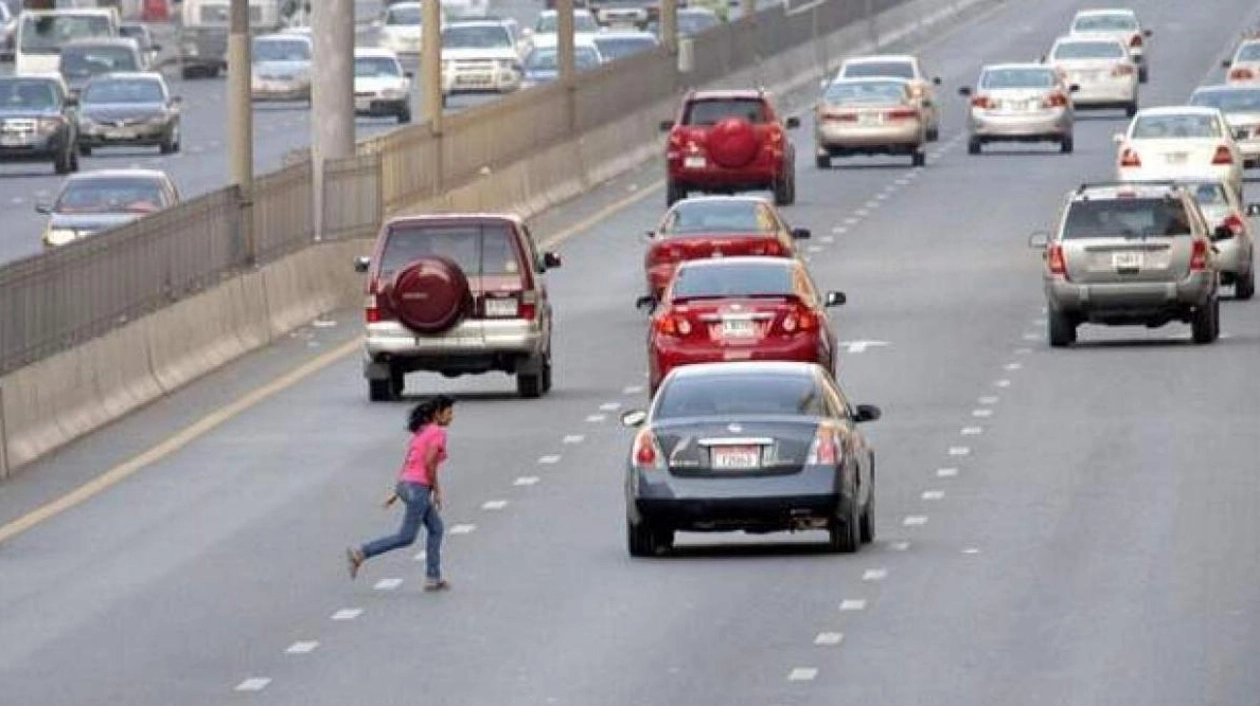Image used for illustrative purpose. Photo: File
Imposing hefty fines and imprisonment to curb jaywalking 'sends a strong message that safety is a top priority in the UAE,' a road safety expert emphasized in response to the latest federal decree law on traffic regulations. When the new law, announced on Friday (October 25), takes effect in March next year, jaywalkers could face imprisonment and a fine of Dh5,000 to Dh10,000 — if the offence results in a traffic accident. Higher penalties will be imposed on any person who crosses from undesignated areas with a 80kmph speed limit or higher. Aside from imprisonment for a period of not less than three months, they could be fined not less than Dh10,000 – whether the violation causes an accident or not.
Dr. Mostafa Al Dah, founder of MA-Traffic Consulting and former head of traffic studies section at the Dubai Police, believes increasing the fines is raising the deterrent value, and people would be prevented or inhibited from committing violations because they will be afraid of the hefty penalties. 'It is really good to see that the authorities are giving attention to this important issue (of jaywalking). Raising fines is a deterrent,' Al Dah told Khaleej Times, adding: 'I personally knew a few people who have actually paid large fines of more than Dh50,000 for other traffic-related violations and they did not flout the law again.'
'The idea is to give a very heavy deterrent to the public, especially now that the population of the UAE is fast growing and we have lots of new people coming in every year,' Al Dah explained. 'This new law sends a very strong message that in the UAE, safety is a top priority, and the government is serious about making everyone follow the rules,' he added.
Al Dah said it has been proven that stricter penalties resulted in better compliance. He cited as an example the administrative deportation of foreign truck drivers who jumped the red light in Dubai. Aside from paying a Dh50,000 penalty to release an impounded truck for jumping the red light, an expat truck driver can also be administratively deported from the UAE. 'After the implementation of the new regulation in July last year, the compliance of heavy truck drivers with respecting the red light has become very high,' Al Dah noted, adding: 'Although that particular provision of the law was not known by many residents, awareness among truck drivers was made really high.'
'It would be in the same vein, I think, that people will comply, and hopefully we won't see many people violate the rules and get fined. The message is clear: Jaywalking is a serious offence and the government takes it very seriously in saving lives,' he underscored.
Jaywalking has claimed the lives of eight people who died in run-over incidents in Dubai last year. Nearly 44,000 people were caught jaywalking in Dubai in 2023, while 320 traffic accidents were recorded that resulted in various levels of injuries to 339 people, according to Dubai Police. Special attention was given to educating people on road safety, especially on safely crossing roads, to prevent pedestrian accidents and save lives, but people still displayed dangerous behaviour and risked their lives crossing the street as cars passed by, the authorities noted. Currently, however, jaywalking is punishable by a Dh400 penalty.
Meanwhile, earlier this year, a driver and two jaywalkers were fined after an accident in Dubai injured the pedestrians. The Dubai Traffic Court convicted the Arab driver for failing to adhere to traffic rules, while the Asian pedestrians were penalised for crossing from an undesignated area. The driver was fined Dh2,000, and the pedestrians Dh400 each. Motorists who have nearly hit pedestrians who crossed undesignated areas welcomed the amendments to the UAE traffic law.
'I nearly hit someone who came out of nowhere. It was not a main road but still motorists were driving up to 60kmph per hour and if I did not hit my brake hard that time, I would have hit the pedestrian who would have had a serious injury,' said Ranjith Malik, a resident of Sharjah. 'Run-over accidents were once notorious in the areas of Al Khan, Al Nahda and Al Dhaid Street. They are much fewer now but still some hard-headed people can be seen jaywalking. This really has to stop,' added Michael Diaz, a Filipino expat who lives in Al Nahda, Sharjah.
Pedestrians, said more footbridges – overpass or underpass – are needed to ensure the safety of passers-by from vehicles. Priyanka Suresh, a student who takes public transport to her university, said: 'We need to have more bridges, especially in school zones and heavily-populated neighbourhoods, to not only lessen the risk of accidents but also to create secure passage for people of all ages and abilities. This way, more people will also be encouraged to use public transport and not have an excuse to cross the road illegally.'
Source link: https://www.khaleejtimes.com






